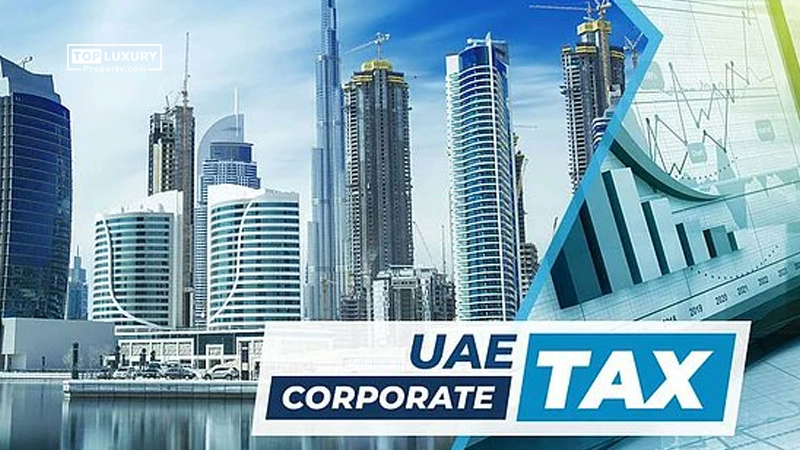UAE Corporate Tax Introduction
The United Arab Emirates (UAE) once had very low taxes, which was the key reason to attract many global businesses and investors. Now, a new UAE Corporate Tax Law has started on June 1, 2023, for new financial years. This change significantly alters the tax landscape, whose main motive is to align UAE with international tax standards and also aims to diversify government revenue sources. As per Ministry of Finance, CT rates are:
0 per cent for taxable income up to AED 375,000
9 per cent for taxable income above AED 375,000 and
a different tax rate for large multinationals that meet specific criteria set with reference to ‘Pillar two’ of the OECD Base Erosion and Profit Shifting Project.
This new tax greatly affects the real estate sector. Understanding Corporate Tax UAE is now vital because property owners and investors need to adapt their plans.
Let’s understand the A to Z of UAE Corporate Tax and its impact on real estate.
Impact of Corporate Tax on Real Estate Businesses & Property Owners
The new UAE Corporate Tax directly affects real estate. It impacts developers and real estate agencies. Individual property owners are also affected. This applies if they conduct business activities.
Real Estate Developers and Agencies
UAE Corporate Tax applies to developers’ net profits. It also affects real estate agencies. Income from property sales is taxed. Commissions, development projects, and related services will be subject to the 9% tax rate after allowable deductions. So, they need to evaluate their expenses, construction and marketing costs, and salaries to determine accurate taxable income.
Property Owners (Individuals and Companies)
The impact on property owners varies. It depends on their ownership and activity.
Individuals with rental income are usually exempt. This applies to personally owned property. However, some rental activities are “businesses.” This is defined by tax law. For example, operating many properties. Or providing extra services, like a hotel. Such individuals might fall under the tax.
Companies holding real estate are taxed. It includes rental income or capital gains. Corporate Tax UAE applies to their net income and covers rental income and property sales. Other related revenues are also included, whereas the eligible expenses are deducted.
- Free Zone Entities
While Free Zone entities generally enjoy tax incentives, the UAE Corporate Tax law introduces specific conditions for qualifying for a 0% tax rate. Real estate activities conducted by Free Zone entities must meet these “qualifying income” criteria, which typically involve substantive activities within the Free Zone and adherence to arm’s length principles for transactions with mainland entities. Non-qualifying income will be subject to the standard 9% rate.
Impact on Taxable Income and Investment Strategy
The UAE Corporate Tax changes taxable income calculation. Real estate entities must adjust. Investment strategies also need re-evaluation.
Calculation of Taxable Income
Taxable income for real estate businesses is net revenue. Allowable expenses are subtracted from gross revenue. Key deductible expenses include:
- Operating expenses (maintenance, utilities, management fees)
- Financing costs (interest on property loans)
- Salaries and wages
- Administrative expenses
- Depreciation of assets, including property
Any profit from selling real estate will be included in taxable income. However, the original cost of buying the property and any money spent on improvements can be deducted. The tax rules for specific transactions like property transfers between related companies will need to be thought through to ensure fair market value.
Investment Strategy Adjustments
Investors and businesses will need to adjust their plans to get the best tax outcome.
- Due Diligence: Do your financial checks to know how much money you will make from real estate investments after tax.
- Structuring Investments: The choice of which legal entity to use to hold real estate (mainland company, Free Zone entity or individual ownership) will become more important as each has different tax implications.
- Debt vs Equity Financing: Since interest expenses on loans are deductible, borrowing to buy properties might become more attractive as it can reduce the amount of income subject to tax. Also diversify your investment.
- Long term vs Short term Holdings: The way capital gains are taxed will influence the decision on how long to hold onto a property. While capital gains are taxed, the benefit of deducting depreciation over many years can help offset some of that tax.
- Tax Planning: Be proactive with tax planning, including knowing all the available exemptions, reliefs, and deductions, and take advantage of the small business relief for businesses with revenues below a certain amount.
UAE Depreciation Rule Introduction
Depreciation is a key accounting concept. It lets businesses deduct asset costs over the asset’s useful life. It shows asset wear and tear and covers obsolescence or consumption. For real estate, depreciation is very important. Properties are long-lived assets. The UAE Corporate Tax law includes 4% depreciation rules where businesses can reduce taxable income and claim a portion of the asset’s cost annually.
How Corporate Tax Impacts 4% Annual Depreciation on Property?
A key part of the UAE Depreciation Rule is 4% annual depreciation. This rate applies to property and covers buildings and fixed structures. Businesses can deduct 4% of the original cost from taxable income each year.
Impact on Taxable Income
The 4% annual depreciation lowers taxable income. It benefits businesses owning depreciable property. For example, a company buys a building for AED 10 million. It can claim 4% of AED 10 million, which equals AED 400,000, reducing gross profit and lowering net profit, which is subject to 9% Corporate Tax UAE.
Example:
- Gross Rental Income: AED 2,000,000
- Operating Expenses: AED 500,000
- Depreciation (4% of AED 10M property): AED 400,000
- Taxable Income before depreciation: AED 1,500,000
- Taxable Income after depreciation: AED 1,100,000
Without depreciation, tax is on AED 1,500,000. With depreciation, it’s on AED 1,100,000. This means lower tax liability. The 4% depreciation is a key tax shield.
Cash Flow and Investment Returns
Depreciation improves business cash flow and reduces their tax payments. Depreciation is a non-cash expense. Yet, it lowers the tax bill. More cash stays within the business. This extra cash can be reinvested and improve returns on property holdings.
Considerations for the 4% Rule
- Eligible Assets: The 4% rate applies to the building part of a property, not the land itself. Land is generally not considered an asset that depreciates. Businesses will need to figure out how to split the cost between the land and the building components.
- Useful Life: A 4% annual depreciation rate means the asset has a useful life of 25 years (100% / 4%). This is the standard useful life for tax purposes, regardless of how long the building actually lasts physically.
- Accounting Methods: Businesses must follow GAAP or IFRS for their financials. These will be the basis for their tax calculations.
What UAE Ministry Says About Property Depreciation
The UAE Ministry of Finance (MoF) is the body that issues all the rules, guidelines and clarifications about the UAE Corporate Tax law. While they are releasing more details, the MoF’s general position on property depreciation is in line with international tax practices that allow businesses to systematically recover the cost of their tangible assets.
The MoF’s Public Clarification on the UAE Corporate Tax Law (for example, CT Public Clarification 2023/04 on Depreciation) outlines the acceptable methods and rates for depreciation. The 4% annual depreciation for buildings and fixed structures is one of these. The Ministry states:
- Depreciation must be calculated using a consistent method from one tax period to the next.
- The asset must be used for the purpose of generating taxable income.
- The amount of depreciation claimed must be reasonable and reflect the actual wear and tear or how old the asset is becoming.
The MoF wants to ensure the tax law is applied fairly and consistently and allow businesses to recover their capital over time. Businesses should refer to the official MoF publications and get professional advice to ensure they are fully compliant with the latest rules on UAE Depreciation Rule.
When to Hold a Property at Original Price?
“Holding a property at original price” means no tax depreciation. Or the cost basis stays unchanged. The UAE Corporate Tax allows depreciation. But some cases involve the original cost. Or depreciation may not apply.
- Non-Depreciable Assets (Land): Land is generally not depreciable. It does not wear out over time. So, land cost is usually the original price.
- Property Not Used for Business Purposes: An individual may hold property for personal use or as a passive investment. It must not be a “business activity.” Then tax depreciation does not apply.
- Specific Accounting Policies (e.g., Investment Property at Fair Value): Some entities, especially those using IFRS, may choose to value investment property at fair value through profit or loss rather than the cost model with depreciation. Under UAE Corporate Tax rules, the tax is calculated using a cost-based approach for calculating taxable income, including the application of the UAE Depreciation Rule. So, the fair value adjustments themselves are generally not taxable or deductible until the asset is disposed of.
- Capital Gains Calculation: When a depreciated property is eventually sold, the “original price” (or adjusted cost basis) becomes important for calculating the capital gain or loss. The accumulated depreciation reduces the book value of the asset. The capital gain is then calculated as the selling price minus the adjusted book value (original cost minus accumulated depreciation). If the property was never depreciated for tax purposes (e.g. it was land), then the original cost would be used directly against the selling price.
In summary, the UAE Depreciation Rule reduces taxable income. It does so through annual deductions. But “original price” is still fundamental. It applies to non-depreciable parts like land. It is also key for capital gains upon disposal.







